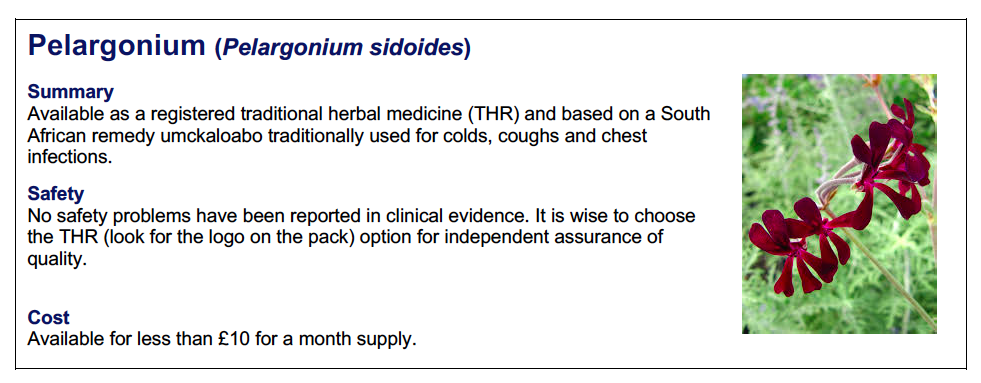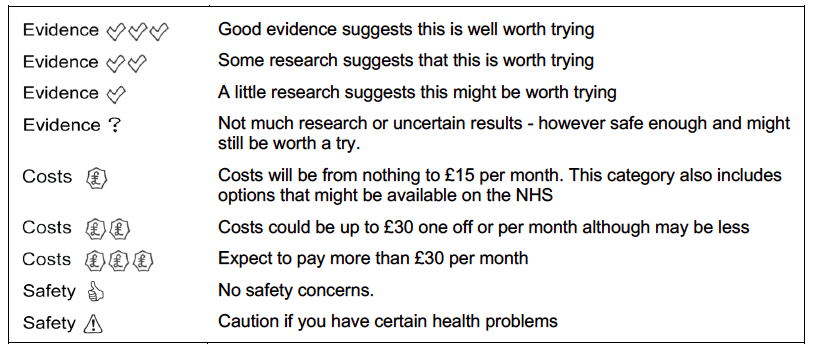Cough

What doctors say*
* Official guidelines from NICE, NHS and other medical authorities.
Should antibiotics be used? >
Not generally suitable for antibiotics. Make an exception if complications, or higher risk of complications.
Likely duration if untreated >
5-25 days.
Conventional self-care advice (NICE) >
- try honey (in over 1s)
- the herbal medicine pelargonium (in over 12s)
- cough medicines containing cough suppressants, except codeine (in over 12s)
- cough medicines containing the expectorant guaifenesin (in over 12s)
Opportunities for antibiotic alternatives >
Before prescription. At any stage unless doctor makes exception.
With prescription. Most home remedies are compatible with antibiotic prescription: do however check with your doctor to be sure.
Note: there are surprisingly few remedies – even prescription medicines – with independent evidence for effectiveness in relieving coughs. It is however worth trying remedies on the Common cold page. Cough is often a complication of this infection and may be relieved by some of the remedies on that page. Variations on the home remedy below are often reported as being helpful.

Pelargonium
> what do these ratings mean?
Systemic reviews of clinical research conclude that there is good quality evidence of the use of pelargonium in relieving the coughs of bronchitis.

Vapour rubs
> what do these ratings mean?
Rubbing mentholated and other aromatic vapours onto the chest or near the nostrils is a very familiar approach to relieving cough. There is some evidence of benefit from this approach at least in children.
Traditional home remedies worth trying
Cough syrup
This delicious all-round cough syrup is particularly good for chest colds, especially in winter where a little warming on the chest is indicated. It is most useful if the cough is productive ie. brings something up, although it may help with dry coughs as well. It also soothes a sore dry throat. Children will love it too!
Collect
- 3 heads fresh elderberries (if these are out of season use half a cup of fresh or frozen blueberries instead).
- 6 chopped fresh or dried cherries (you can leave the stones in).
- Handful finely chopped sage leaves.
- 4 teaspoonsful fennel seeds.
- 2 teaspoonsful cinnamon powder.
- 1 teaspoonful cloves.
- Half teaspoonful ginger powder.
Put these into a saucepan. Add 500 ml of water and bring to boil. Simmer until you have around 100ml of water left. Remove any cherry stones and put through blender until smooth. Then squeeze hard through some muslin till you get around 100ml of thick liquid. Put back into the saucepan.
Add
- 100 ml clear honey.
- Juice of one lemon.
- 100 ml vegetable glycerine
Bring back to boil and simmer for 2 minutes.
Pour into glass bottles and keep in the fridge.
Label with date and consume within a month.
Take a teaspoonful 5-6 times a day as required
Disclaimer
Knowledge and best practice in the health field are constantly changing. Each person and illness is also unique and no general information can anticipate every circumstance, nor be appropriate for every reader. Each individual case is best assessed in person by a qualified health advisor.
In the case of remedies or other products, users should read the label carefully for detailed information about safe use and in the case of natural products should choose responsible manufacturers with independently assured quality standards and safety monitoring procedures.
To the fullest extent of the law, neither the College of Medicine nor the authors, contributors or editors, assume any liability for any injury and/or damage to persons or property as a matter of products liability, negligence or otherwise, or from any use or operation of any methods, products, instructions or ideas contained in the materials herein.



